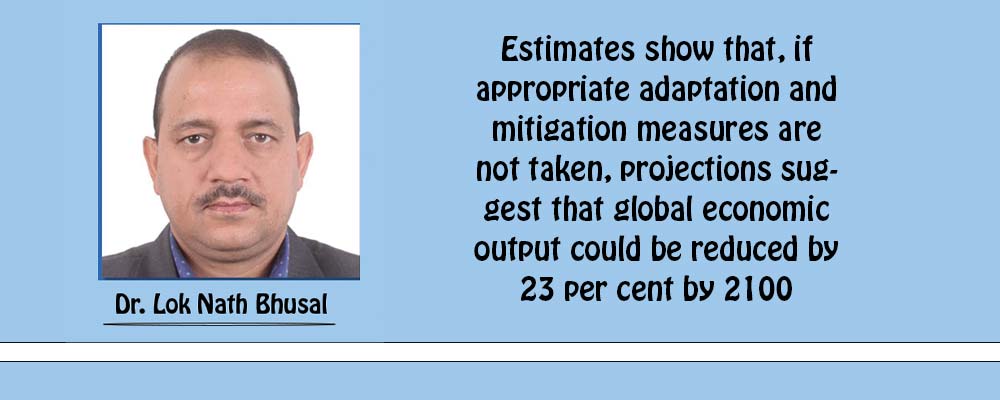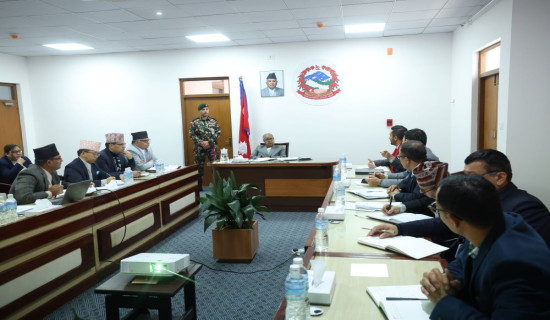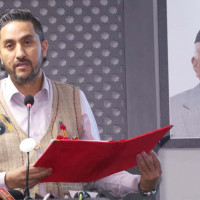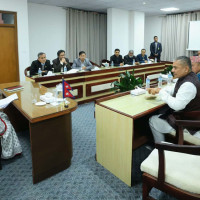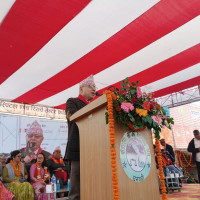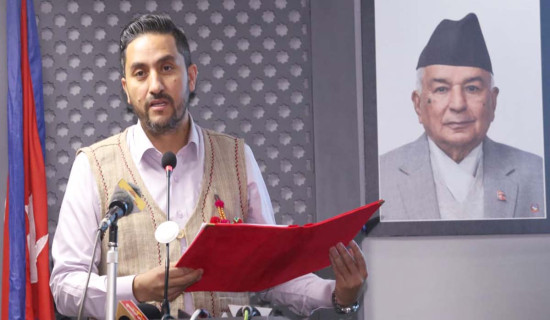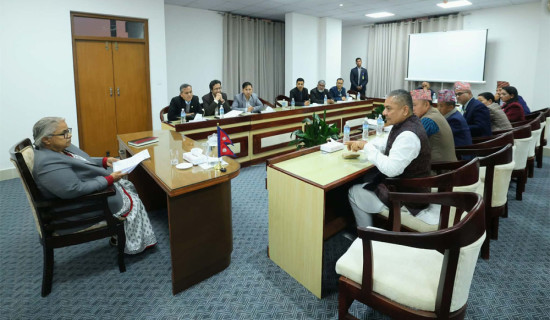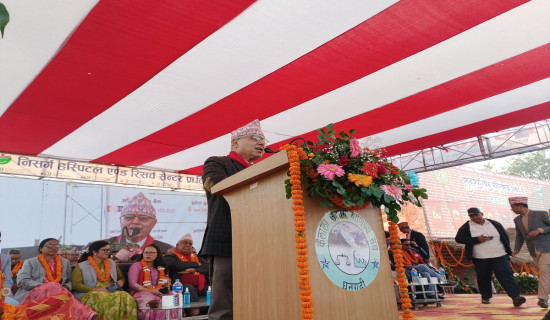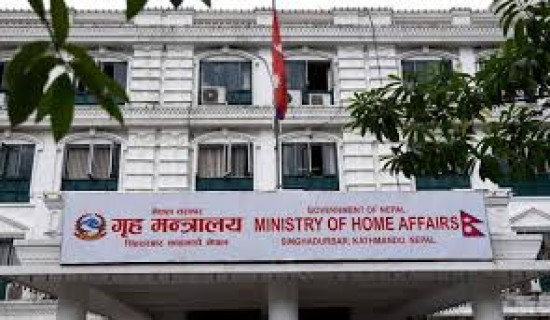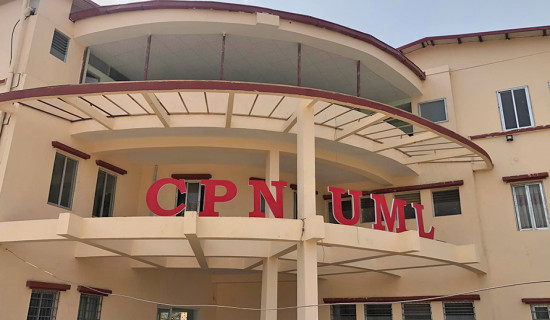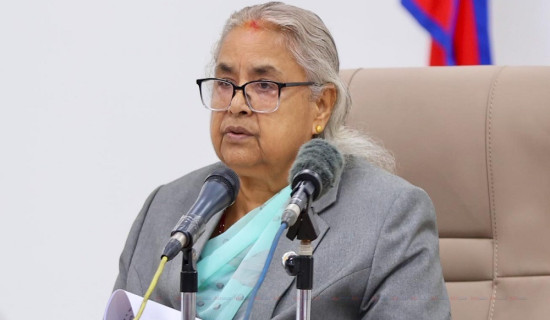- Tuesday, 9 December 2025
Climate Change Aggravates Poverty
Polluting the environment for a higher standard of living has altered our Earth’s climate. This is called climate change. Climate change is real and its reality is already being faced around the globe. Mountains are melting and oceans are rising. Extreme weather events have become frequent. Production and economic cycles have been disrupted due to climate change. Its estimated consequences are even worse and beyond our wildest expectations. Productive land has been degraded and agricultural yields have been substantially reduced. The poor and vulnerable people are going to be affected the most.
According to a new World Bank study report, climate change could significantly slow progress in poverty reduction, and climate-induced income losses could push an additional 41 million people into extreme poverty by 2050. This is terrible and going to reverse the achievements in poverty reduction over the years. The projections in the report named “Future of Poverty: Projecting the Impact of Climate Change on Global Poverty through 2050” show that the number of poor could rise by up to 148.8 million, with those in South Asia projected to be at 48.8 million by 2030. These will be both new and old poor. As per the findings, the number of people living in extreme poverty worldwide could be nearly doubled due to climate change. This reveals the depth of the climate crisis.
Structural vulnerabilities
Poor regions will be more affected because of their own structural impediments. As per the report, the rise in poverty due to climate change is likely to be profound in Sub-Saharan Africa, South Asia, and Latin America and the Caribbean, where the effects of extreme weather events are likely to interact with existing structural vulnerabilities and weaker social protection systems. This demands the extension of social protection coverage and adequacy in the regions with weak climate resiliency. This can be done through extended social safety nets such as pro-poor cash transfers and subsidies for the less privileged. An entirely new climate-sensitive social protection mechanism might also be required to address the new challenges.
Considering the global nature of the issue, the study has very rightly called for international cooperation. High-income countries, which have contributed the most to global emissions since the industrial revolution, have a responsibility to support low- and middle-income countries in their efforts to adapt to and mitigate climate change. This is all about ensuring accountability at the global level. This includes providing financial resources, technology transfer, and capacity-building support to help low and middle-income countries build resilience to climate shocks and transition to low-carbon development pathways. However, such a pathway must not undermine the prosperity ambitions of these developing nations. The support for the extension of productive social protection coverage must be the core of international cooperation.
Poverty and inequality are two sides of the same coin. The World Bank report stresses the effort to reduce income inequality as a central component of any poverty reduction strategy. This is because the projections in the report show that even small increases in inequality are likely to lead to a big increase in poverty levels. Unfortunately, this linkage is either less understood or ignored by global and national policymakers, even though poverty anywhere is a threat to prosperity everywhere. This also suggests that the development model adopted by today’s so-called developed countries was wrong and environmentally costly. This development model is not beneficial to countries like Nepal.
The report has suggested adopting policies that promote inclusive economic growth, reduce barriers to education and employment, break other structural impediments and enhance social protection systems. These will be critical for ensuring that the benefits of economic development are shared more broadly and equitably. Dozens of evidence demonstrate that such policies, with their strict implementation, have become instrumental in overcoming poverty and inequality at the same time in many social democratic countries in Western Europe and elsewhere. Over the years, these countries have institutionalised and strengthened socio-economic security and provided targeted support to the poorest and most vulnerable populations, even though they largely failed to protect the environment.
Socio-economic security
Socio-economic security includes many things. This includes expanding access to healthcare, education, and financial services, as well as improving the resilience of livelihoods through investments in agriculture, infrastructure, pro-poor capacity building and climate adaptation measures. This also includes several labour market interventions, such as cash for work schemes for the unemployed and various cash transfers. Price, poverty and inequality are interrelated. The new report claims that climate change-induced rising food prices may significantly increase global poverty and inequality, particularly in the developing world, where food consumption accounts for a large share of household expenditures. This will reduce savings and capital formation, thereby generating inter-generational poverty.
Inaction is going to be very costly. Estimates show that, if appropriate adaptation and mitigation measures are not taken, projections suggest that global economic output could be reduced by 23 per cent by 2100 compared to a world without climate change. This will exacerbate unemployment, poverty and inequality globally. The report further claims that, in most scenarios, projected global income losses will exceed 20 percent, underscoring the potentially severe economic consequences of inaction. The report has also pointed out the fact that even though rich and poor countries respond similarly to temperature changes, the economic impacts are substantially larger for the poor ones, as most of these are predominantly located in already warm regions of Asia, Africa and Latin America.
(Dr. Bhusal is a development expert.)

